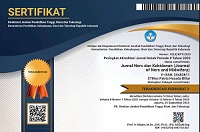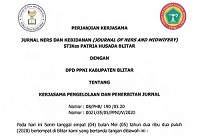Positive correlation of Hypertension and Cognitive Function of Elderly
DOI:
https://doi.org/10.26699/jnk.v9i3.ART.p311-320Keywords:
cognitive function, hypertension, elderlyAbstract
Biological changes in the elderly are one of the triggers for the emergence of hypertension which can cause changes in cognitive function. The purpose was to analyze the correlation between hypertension and cognitive function in the elderly. The design was correlation descriptive research design with the cross-sectional approach. The sampling technique was purposive sampling, the number of samples of respondents was 56 people. The research was conducted at Integrated Healthcare Center Elderly, Malang City. The instrument used to while the cognitive function in the elderly uses the MMSE. Analysis used the Spearman rank test with an alpha value of 0.05 (95% CI). The results showed that there was a significant correlation between hypertension and cognitive function in the elderly (r=0.532 and p=0.000). The direction of the correlation is positive, meaning that the more severe hypertension suffered by the elderly, the more severe they will tend to experience more severe cognitive function impairments. Based on the results of this study, it is recommended for people with hypertension do blood pressure screening and undergo hypertension treatment regularly. This is very important so that prevention and treatment can be carried out earlier to prevent more severe cognitive impairment.
References
Akbar, Fredy, Hamdan Nur, Umi Indar H. 2020. Characteristics of hypertension in the elderly in Buku village, YPPP Wonomulyo Nursing Academy. JWK: Vol 5, No 2, Year 2020 (ISSN: 2548-4702).
Arshinta, L (2018). The Correlation Between Hypertension with Decreased Cognitive Function at Samalantan Public Health Center, West Kalimantan. Callosum Neurology Journal: Volume 1, Numbers 2: 41-46.
Arneud, SLB & Douglas, PM (2016). The stress response paradox: Fighting degeneration at the cost of cancer. The FEBS Journal, 283(22), 4047-4055.doi:10.1111/febs.13764.
A. Robles, B & Sampedro, G. (2018). New evidence of the relative protective effects of neurodegenerative diseases and cancer against each other. Neurology. doi:10.1016/j.nrleng.2017.01.011
Bherer, L., Erickson, K., & Liu, T. (2013). A review of the effects of physical activity and exercise on cognitive and brain functions in older adults. Journal of Aging Research, 1-8. doi:10.1155/2013/657508.
Indonesian Central Statistics Agency, 2021 Population Projection 2010-2035
Central Bureau of Statistics, 2015. Statistics of the Elderly Population 2014 Results of the National Socio-Economic Survey. Jakarta: Central Bureau of Statistics.
Boyle, PA, Buchman, AS, Barnes, LL, & Bennett, DA (2010a). Effect of a purpose in life on risk of incident Alzheimer's disease and mild cognitive impairment in community-dwelling older persons. Arch Gene Psychiatry, 67(3), 304-310. doi:10.1001/archgenpsychiatry.2009.208
Darmojo, RB. 2009. The theory of the aging process. In: Martono H, Pranarka K (editor). Textbook Boedhi-Darmojo Geriatrics (Elderly Health Sciences) 4th Edition pages 1-13. Jakarta: Publishing Center of the Department of Internal Medicine, Faculty of Medicine, University of Indonesia.
Goode, B., & Booth, G. Dementia care. London: British Library.
Greenwood, PM, & Parasuraman, R. (2012). Nurturing the older brain & mind. Retrieved from http://www.buulib.com.
Grinspun, D. (2016). Delirium, dementia, and depression in older adults: assessment and care. Retrieved fromhttp://www.buulib.com
Handayani, VV 2020. This is the Reason Elderly Vulnerable to Hypertension. Article. Halodoc.com
Hendershott, TR, Zhu, D., Llanes, S., & Poston, KI (2017). Domain-specific accuracy of the montreal cognitive assessment subsections in parkinson's disease. Parkinsonism Relat Disord, 38, 31-34. doi: 10.1016/j.parkreldis.2017.02.008
Julianti, R. and Budiono A. 2008. Dementia. Pekanbaru: University of Riau.
Katzman, R. 2013. Education and the prevalence of dementia and Alzheimer's disease. neurologist. 43. Pp:13-20.
Indonesian Ministry of Health. Guidelines for the Assessment of Elderly Health Programs for Health Workers. Jakarta: Ministry of Health of the Republic of Indonesia; 2010.
Matthew Dimas Reza Dana Ismaya, Ratna Kusumawati, Bhisma Murti. 2017. The correlation between hypertension and cognitive function disorders in the elderly at the Elderly Posyandu fostered by the Community Health Center in Nektoran, Surakarta. Faculty of medicine, Eleven March University. Surakarta.
Novitaningtyas, Tri. 2014. “Correlation of Characteristics (Age, Gender, Education Level) and Physical Activity with Blood Pressure in the Elderly in Makamhaji Village, Kartasura District, Sukoharjo Regency 39 (1): 1–15.https://doi.org/10.4324/97813158531 78.
Taraghi, Z., Ahmad, AAK, Mahshid, F., Jamshid, Y., Ali, M., Seied, KB, 2016. Cognitive Impairment Among Elderly Patients With Chronic Heart Failure and Related Factors. Iran J Psychiatry Behavior Sci. Vol 10
Taufik, ES, 2014. Effect of hypertension on cognitive function in the elderly. Semarang, Indonesia, Diponegoro University. Thesis. Young Medika Media Journal.
Tuppen, J. (2012). The benefits of groups that provide cognitive stimulation for people with dementia. Nursing Older People, 24(10), 20-24.
Vadikolias K., Tsiakiri-Vatamidis A, Tripsianis G, et al. 2012. Mild cognitive impairment: effect of education on the verbal and nonverbal tasks performance decline. Brain and behavior. 2(ince 2001), pp:620-827
Wahyuniarti, Anisa, Moch Bahrudin, and Fathiyah Safithri. 2017. The correlation between hypertension and cognitive decline in the elderly. Article. Faculty of Medicine, University of Muhammadiyah Malang.
Downloads
Published
How to Cite
Issue
Section
License
Copyright (c) 2022 Jurnal Ners dan Kebidanan (Journal of Ners and Midwifery)

This work is licensed under a Creative Commons Attribution-ShareAlike 4.0 International License.






